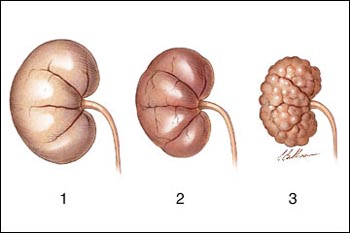Feline
Kidney failure, renal insufficiency, renal disease
Cats of any breed, sex and age can be affected; however, older cats most frequently develop the illness. The mean age of chronic renal failure in the cat is nine years. Some types of kidney disease can be passed genetically among Abyssinian and Persian breeds. All animals and people can develop chronic renal failure.
Because the kidneys are vital, life-sustaining organs, chronic kidney failure can compromise a cat's health greatly. When working properly, the kidneys filter waste products from the blood stream into the urine. A cat with poorly functioning kidneys may drink increased amounts of water and urinate more often -- in an attempt to flush out those waste products in its blood stream that the kidneys are no longer capable of eliminating into the urine.

- Acute renal failure
- Normal kidney
- Chronic renal failure
Eventually the cat's attempts to compensate for the failure of its kidneys will become insufficient. As the disease gets more severe, many serious complications may result. Ulcers in the mouth and stomach, anemia, and urinary tract infections are common occurrences among cats with chronic kidney failure. High blood pressure -- which can lead to blindness -- is one of the more serious complications.
Generally, older cats get chronic kidney failure, and the disease tends to worsen with age.





































